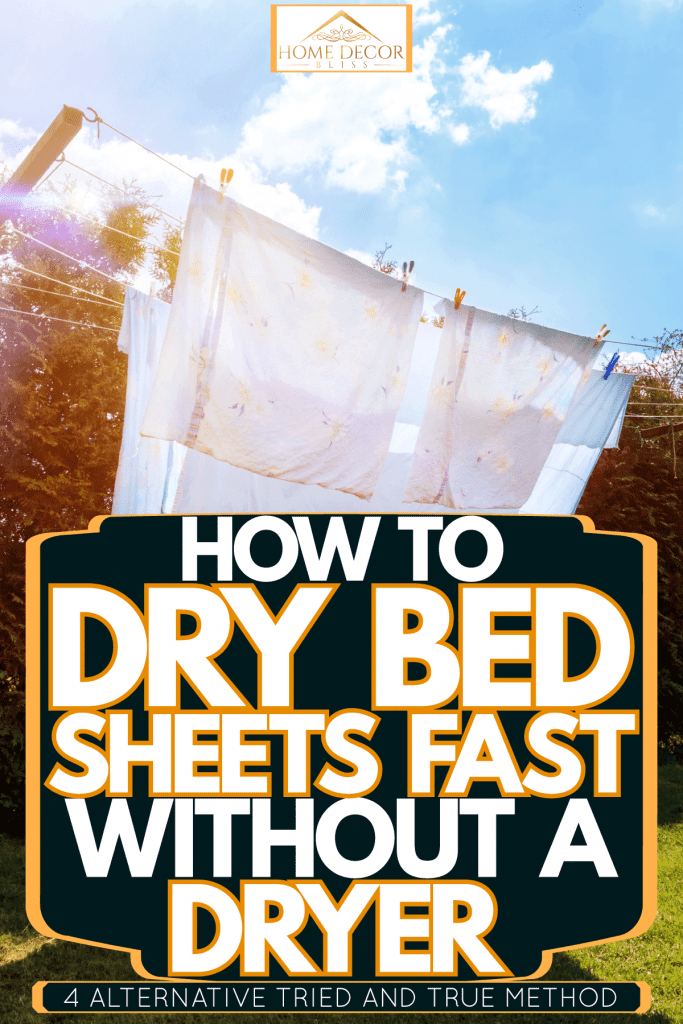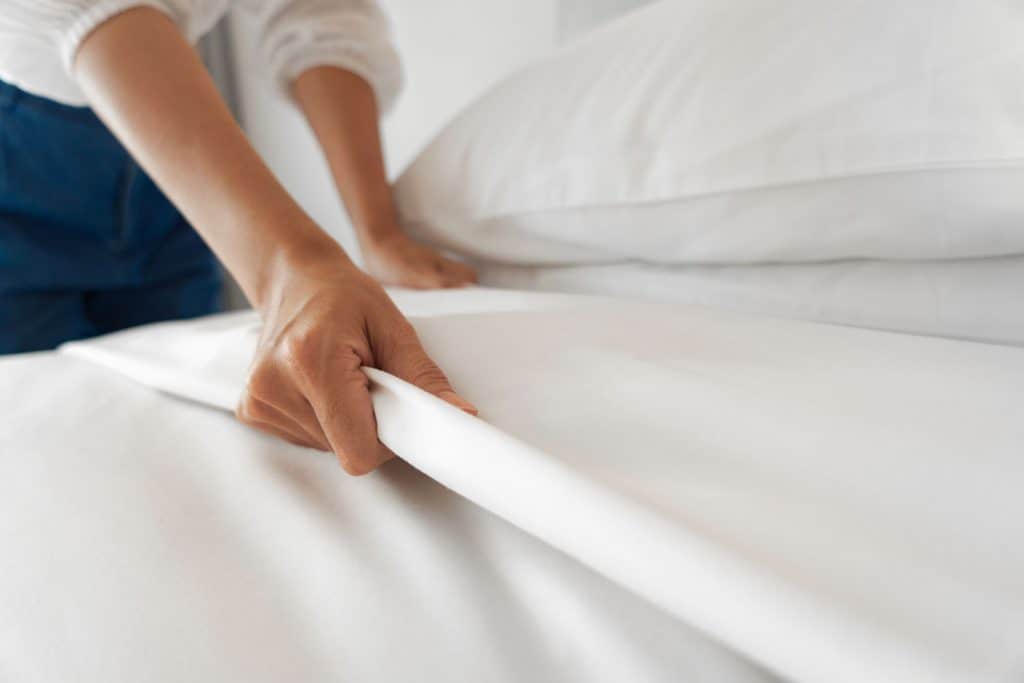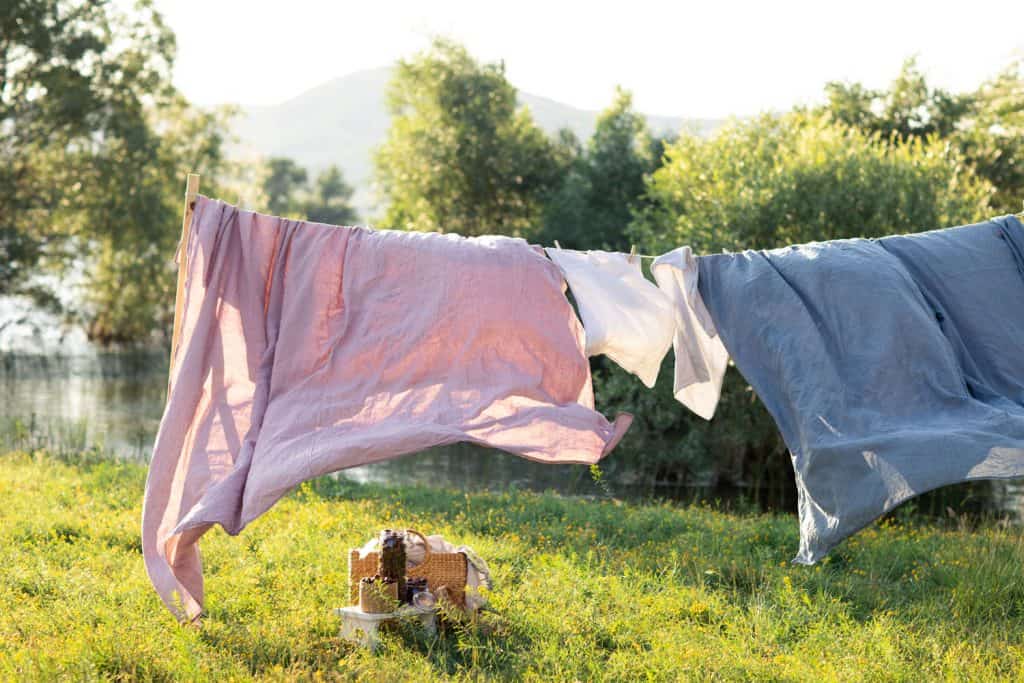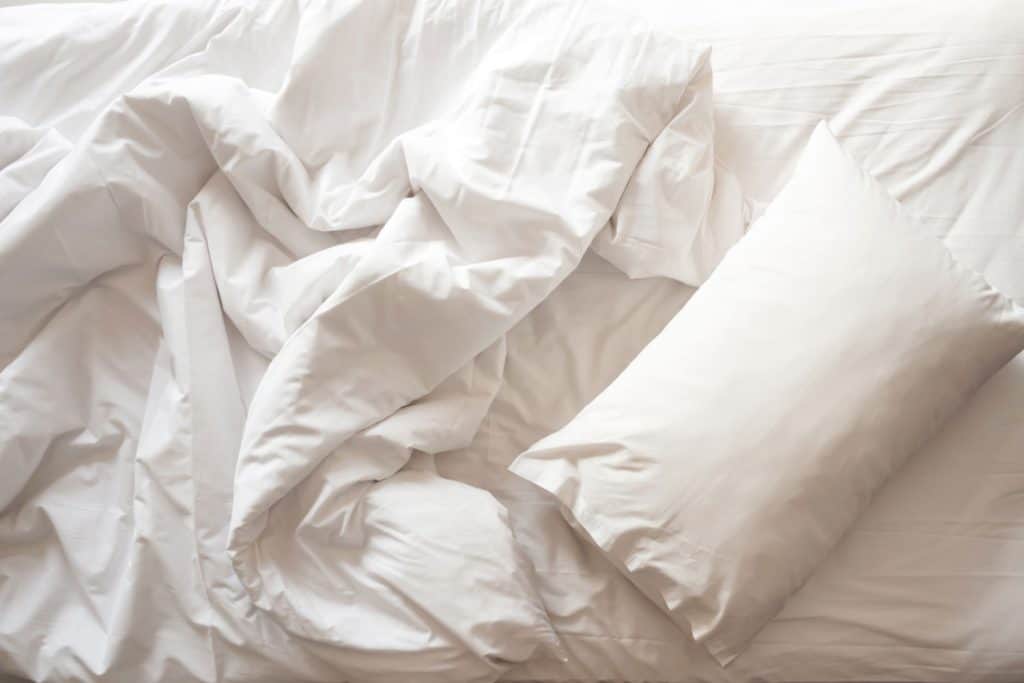Whether you don't have a dryer or your sheets can't take the heat of one, you may feel stuck on how to quickly dry your bed sheets. How do you dry them without using a dryer? We have done our research to find you some alternatives.
There are many ways to dry bed sheets without using a dryer. A few of our top picks include:
- Line drying your sheets near a fan or warm window
- Ironing your sheets under a dry towel
- Using a hairdryer on your wet sheets
- Rolling your bedsheets into a towel
As we begin, we will cover how to dry bedding without using a machine. Whether you want to save energy or don't have a machine, we've got an idea for you. With that said, let's dive right into this topic!

Can You Dry Bed Sheets Without Using The Dryer?
When it comes to drying sheets without using the dryer, this is possible. Like we covered above, there are plenty of good alternatives to machine drying, but you might need to get creative.
Lucky for you, this is as easy as a hairdryer, clothing line, iron, or towel, so you might already be set for the task. That said, some methods are quicker than others, so try to keep that in mind.

What's The Fastest Way To Dry Sheets Without A Dryer?
For anyone in a pinch, we recommend either line or blow-drying your sheets if you don't want to throw them in the machine. Generally, it is best to hang your sheets somewhere with direct sunlight, but if that's not possible, a hairdryer will do.
To dry your bedsheets with a hairdryer:
- Turn your hairdryer to its highest heat setting.
- Moving across your sheets, hold your hairdryer in place for 15 seconds.
- Rotate your bedsheets as you go, avoiding direct contact with your hairdryer.
- Repeat this process for about 20 minutes or until your sheets are dry to the touch.
We may include affiliate links and curated AI content to highlight top design styles.
This hair dryer uses pearl ceramic technology, has a professional-grade motor, features three heat and two-speed settings, and is 1875 watts.
View this hairdryer on Amazon here.
How Long Do Bed Sheets Take To Air Dry?
Typically, you can expect bedsheets to dry in 30 to 45 minutes if you use the hairdryer and between two and four hours if you line/air dry them. Although this timeframe varies, drying your sheets without using a machine will take a couple of hours, so make sure to allow enough time.
That said, if you live somewhere with minimal humidity or decide to use a hairdryer on your sheets, they might get dry in closer to an hour.
Is It Better To Air Dry Bed Sheets?
In general, we would say air drying your bed sheets will be better for them. Although the dryer is convenient, it can beat up certain fabrics and cause your bedding to fade.
On top of that, using the drying machine also requires tons of energy, which isn't great for the planet. Of course, that's not to say the dryer is always a bad idea, but air-drying your sheets is certainly the better option.
Where Do You Hang Sheets To Dry?

When it comes to where you should hang sheets to dry, we recommend a bright, warm spot that gets a breeze. Even if it isn't necessarily windy out, a slight amount of draft will help get your sheets dry quicker.
Of course, if you can't find this type of location where you are, letting your sheets dry near a fan will work too. Regardless, try to keep your sheets hung up high enough where they aren't touching the ground, and make sure not to stack them on top of each other.
Can You Line Dry Sheets Inside?
For those wanting to line dry their sheets indoors, this is also fine. Although indoor drying won't usually be as fast as outdoor, line drying your sheets inside will still get the job done.
That said, try to hang your sheets somewhere with little moisture, avoiding the bathroom or laundry room. A good place to dry your sheets is in the dining or living room, which tends to get the most sunlight.
Retractable Clothesline
This clothesline is retractable, has an adjustable string, won't rust, extends 9.2 feet, and can hold up to 11 pounds.
Follow this link to see it on Amazon here.
Do Sheets Shrink In The Dryer?
Generally, sheets will shrink if you leave them in the dryer for too long. Just like clothing, using high heat on your bedding can cause its fibers to shrink and lose their shape, so keep that in mind.
With that said, if you use low heat on your sheets, you shouldn't run into shrinking, but it will take longer to dry your bedding.
How Long Should Sheets Be In The Dryer?
Ideally, you should only need to have your sheets in the dryer for 30 to 45 minutes. Most often, if you have your dryer set to a medium heat setting, your sheets should be dry enough to take out closer to 45 minutes, but this varies.
Sheet thickness will play a big role in how long they take to dry, so there isn't one exact timeframe you need to follow. That said, if your sheets are still damp after 30 to 45 minutes in the dryer, your heat setting may be too low.
How Often Should Bed Sheets Be Washed?

When it comes to how often you should wash your sheets, we recommend doing this every one to two weeks. Depending on whether you shower before bed, this can affect how often your bed sheets need to be cleaned.
Usually, as long as you don't get into bed dirty or wear your outdoor clothing to sleep, you should be ok to wait closer to 14 days between washes, but this is up to you. According to HealthLine, not washing your sheets at least twice per month can expose you to fungi, bacteria, pollen, and animal dander, so doing this is essential.
Do I Need To Wash My Comforter?
For those debating cleaning their comforter with their sheets, we do think this is a good routine to develop. Although your actual comforter doesn't need to go into the washer often, cleaning its cover with your sheets is always a good idea.
Your comforter should get washed weekly, but if you consistently use a top sheet, you should be able to wait closer to every two to four weeks.
Is It Bad To Put Damp Sheets On Your Bed?
Although this might sound weird, putting damp sheets on your bed is a great idea. The reasoning behind this is that making your bed while its sheets are still damp will help them dry wrinkle-free, which everybody loves.
But keep in mind, you don't want to make your bed with soaking wet sheets, so let them dry a bit before you put them on.
Can You Iron Sheets Dry?
If you prefer not to use a hairdryer but want to speed up your sheet's dry time, yes, ironing can work. In general, you want to iron your sheets once they are on your bed, to avoid burning them/yourself.
That said, not all mattresses can handle high heat, so feel free to place a towel down before getting started. Once you do that, move your iron around your bedding for about 10 to 15 minutes, and you should be good to go.
To Wrap Things Up
Whether you want to save energy or don't have a dryer, figuring out how to get your sheets dried is important. We found that there are ways to do this without using the machine, including line drying, using a hairdryer, ironing, and even using a towel.
When it comes to where you should hang your bedsheets to dry, we recommend a bright, warm location that gets a breeze. For those somewhere without an outdoor spot to hang their sheets, we think using a hairdryer or iron is also a great idea to try. Regardless, remember to wash your bedding every one to two weeks, and don't be afraid to make your bed while your sheets are still damp to avoid wrinkling.
Want some more bedding and linen guidance? Check out these helpful posts below!
How To Soften Towels [Including Without A Dryer]




